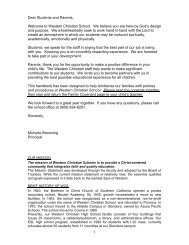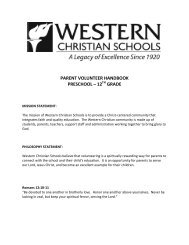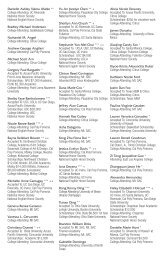Answers to Your Toughest Homework Questions - Western Christian ...
Answers to Your Toughest Homework Questions - Western Christian ...
Answers to Your Toughest Homework Questions - Western Christian ...
Create successful ePaper yourself
Turn your PDF publications into a flip-book with our unique Google optimized e-Paper software.
Michelle Browning, M.A.Principal
We will cover some simple ideas on how parents canmaximize their child’s chances <strong>to</strong> develop the skills,habits and attitudes needed for lifelong success.
Educa<strong>to</strong>rs generally agree on these guidelines:• Grades K-2 – 10-20 minutes per day• Grades 3-6 - 30-60 minutes daily
The amount of homework will vary by subject. Inaddition <strong>to</strong> daily assignments, older students may alsoreceive long-term projects, such as term papers, thatmay have deadlines weeks away. The key for academicsuccess for teenagers is organization and planning.
It may help parents of middle and high schoolstudents <strong>to</strong> discuss with their child’s teachers theclassroom homework policies (ask how much timeeach teacher expects students <strong>to</strong> spend on homeworknightly.
K 15 minutes1-2 30 minutes3-4 45 minutes5 1 hour6-8 1 ½ hoursThis does not include daily reading or time needed<strong>to</strong> study. If a student chooses <strong>to</strong> study for a test inone night, the consequence is more homework thatnight.
• Assume homework is assigned every night or studyingis required.• Ask younger children <strong>to</strong> show you their work so youcan check it and help them correct their mistakes byworking on the answer <strong>to</strong>gether. Ask your child <strong>to</strong>explain the reasoning for his answers. This developscritical thinking skills.• Check RenWeb!
• Make studying, not just homework, a daily habit. Evenif a student does not have an assignment due the nextday, he can use that time <strong>to</strong> read, review his notes ororganize his backpack.
• Ask younger children <strong>to</strong> show you their work so youcan check it and help them correct their mistakes byworking on the answer <strong>to</strong>gether. Ask your child <strong>to</strong>explain the reasoning for his answers. This developscritical thinking skills.
1. Parents can maximize their child’s chances for successin school by creating a home environment that workswith your child <strong>to</strong> efficiently tackle school tasks.
2. Set Goals: Help your child set attainable goals foreach class and help her identify what will need <strong>to</strong> bedone <strong>to</strong> reach each goal. For example, <strong>to</strong> get an A inAmerican His<strong>to</strong>ry she will need <strong>to</strong> turn in all herhomework, participate in class, etc.
3. Know <strong>Your</strong> Child: There are different types oflearners. If you help your child work within his style,he will work more effectively.For more information on your child’s learning style,talk <strong>to</strong> your child’s teacher. You may also utilize ourResource Teacher, Julie Weaver, who can be contactedthrough the school office.
4. Set Weekly Miles<strong>to</strong>nes: For big projects or exams,get a large calendar for your child’s desk area and helpher set short timelines <strong>to</strong> ensure projects and studyingaren’t left until the night before.
5. Celebrate Success: Congratulate your child wheneach miles<strong>to</strong>ne is met.
Here’s a shocking fact!Most students are not internally motivated <strong>to</strong> dohomework.
• Figure out what external motiva<strong>to</strong>rs you can use <strong>to</strong>ensure homework is completed each night. That way,your children will know that there are positiveconsequences <strong>to</strong> their actions.• Try <strong>to</strong>: Keep the rewards significant and interesting,and the negative has <strong>to</strong> have an adverse effect.• Try not <strong>to</strong>: Boring a child is probably the worst thingyou can do – either putting him in “time-out”, or if youhave a teenager, taking away the keys <strong>to</strong> the car, so shecan’t go out that weekend.• What works for you?
<strong>Homework</strong> will become second nature and maybeyour kids will become internally motivated over time.
1. Keep a schedule: Students should keep a schedule ofclasses, assignments and other key dates. They will beless likely <strong>to</strong> find themselves scrambling <strong>to</strong> complete aproject at the last minute or cramming the nightbefore a big test. The more comprehensive theschedule, the more efficient most students will be incompleting their schoolwork and juggling after-schoolactivities.
2. Take effective notes in class: Effective note-taking isa key academic skill that is rarely taught in theclassroom. Note-taking skills include identifying keyinformation and capturing it in a style that makes foreffective studying later. Each child is unique anddifferent students need different types of notes. It’simportant for students <strong>to</strong> find the note-takingapproach that best works for them.
3. Read assignments: As students move in<strong>to</strong> highergrades, they’re assigned larger and more complexreading assignments. Students need <strong>to</strong> deliberatelylearn <strong>to</strong> read for key information. If reading skills areweak, it’s important for the student <strong>to</strong> seek helpimproving them. Otherwise, performance in manysubjects may be impacted.
By deliberately focusing on improving study skills,students can see improvements in all aspects of theirschoolwork.
















